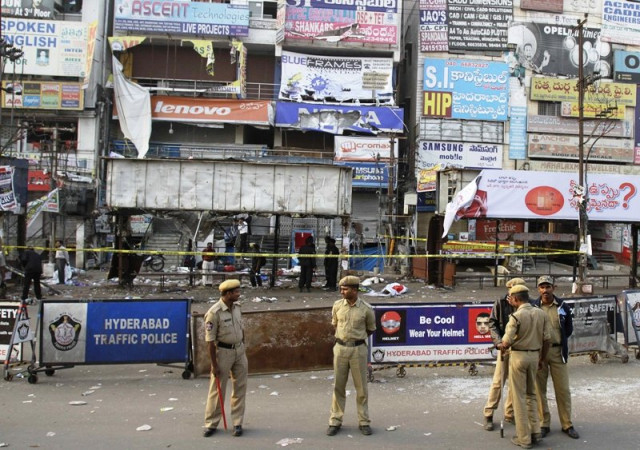India police say were warned about Hyderabad bomb threat
The blasts that killed 18 people have added uncertainty to the Australian cricket team's upcoming tour of India

Policemen stand guard as forensic officials inspect the site of an explosion at Dilsukh Nagar in the southern Indian city of Hyderabad. PHOTO: REUTERS/Krishnendu Halder
The near-simultaneous attacks on Thursday night outside a cinema and a bus stand in Dilsukh Nagar district were the first deadly bombings in India since 2011 and triggered international condemnation, including from rival Pakistan.
They also raised questions about whether Australia's cricket team would go ahead with a scheduled match against India in Hyderabad starting on March 2, although the tourists said the Test was still on for now.
As investigators sifted through the wreckage in their hunt for the perpetrators, Indian Prime Minister Manmohan Singh said those responsible for the "dastardly act" would be punished.
No group has claimed responsibility but newspapers pointed the finger at Indian Mujahideen. A senior detective said two of the group's militants had spoken of a possible attack in the area during interrogation last October.
"We interrogated two militants who said they had recced various spots in Delhi, Mumbai, Hyderabad, Pune for a possible attack," said S N Shrivastava, a Delhi police commissioner with responsibility for anti-terror operations.
"One of the places they mentioned was Dilsukh Nagar, which was hit last night," he told AFP.
The main opposition Bhartiya Janata Party seized on the revelation as a sign of intelligence failure by the Congress party-led government.
"If they had specific information, what was the central government and the state government doing? Why was nothing done to prevent such an incident?" Sushma Swaraj, the BJP's leader in parliament, told lawmakers.
Indian Mujahideen has claimed responsibility for numerous bombings in recent years, and is often listed as a suspect in attacks across the country.
While Hindus form the majority of the population in Hyderabad, there is a sizeable community of Muslims living in the old quarter.
The attacks came at a time when India was on alert after the recent hanging of a separatist unleashed protests in the Muslim-majority region of Kashmir.
Questioned about Indian Mujahideen's possible involvement, Home Minister Shushil Kumar Shinde said it was too early to say.
While authorities had received intelligence of a possible threat of attack, "it was not specific", he added.
A report on India's NDTV network said the cables of closed circuit television cameras had been cut days before the blasts.
Speaking on a visit to the scene, Shinde put the death toll at 14 and the number of injured at 119. N. Rao, a senior police official in Hyderabad, gave the toll as 16, with 80 wounded.
Police said three of the dead were college students while one of the most seriously injured was a pregnant woman.
Sambaraju Shylaja, a receptionist who was in the area at the time, told how the blasts triggered panic as people feared there could be yet more attacks.
"Everything was flying around, everything was so threatening and horrible, bodies were lying around everywhere. Everyone was rushing for their lives," she told AFP.
Hyderabad is one of the main hubs of the country's computing industry and hosts local offices of Google and Microsoft.
Commenting on the upcoming Test in Hyderabad, Cricket Australia chief executive James Sutherland said he was taking advice from authorities.
"As far as I'm concerned we are playing the second Test in Hyderabad next week. That's where we are at," said Sutherland, who is with the team in Chennai for the opening Test which began Friday.
Newspapers summed up the sense of anger, with the front page of India Today reading: "Serial Terror Returns to Hyderabad".
In May 2007, 11 people were killed in a blast at a mosque in Hyderabad and five more died when police fired at Muslim protesters. Months later in August, 40 people were killed when two blasts hit an auditorium and outdoor restaurant.
New US Secretary of State John Kerry expressed his sympathies for the "brave people" of Hyderabad while UN chief Ban Ki-Moon "strongly condemn(ed) the indiscriminate attacks".
Pakistan, accused by New Delhi of responsibility for previous attacks in India, said "all acts of terrorism are unjustifiable regardless of their motivation".
"Being itself a victim of terrorism, Pakistan fully understands and shares the pain and agony of the people of India," said a foreign ministry statement.



















COMMENTS
Comments are moderated and generally will be posted if they are on-topic and not abusive.
For more information, please see our Comments FAQ